Menu
Lessons & Articles About K–12 | News Coverage | Fact Sheets | Books | Articles | Calls to Action | Films and Film Clips | Podcasts | From the Archives | Climate and Environment | Projects | Classroom Stories
At Rethinking Schools and Teaching for Change we are outraged by the ongoing slaughter in Gaza, and the rising death toll in the West Bank. Israel has turned Gaza into a “graveyard for children,” in the words of U.N. Secretary-General António Guterres — and the United States has supplied Israel with weapons and diplomatic cover for their atrocities. No doubt, there is a long history of violence in the region — including the Oct. 7, 2023, Hamas attacks — but the unfolding genocide, including the destruction of Gaza’s public health infrastructure and the intentional creation of famine, must be condemned. We add our voice to the call for an immediate, lasting cease-fire in Gaza. As Howard Zinn said,
We need to decide that we will not go to war, whatever reason is conjured up by the politicians or the media, because war in our time is always indiscriminate, a war against innocents, a war against children.
One cannot understand this tragedy without acknowledging its history. While many education groups provide resources for teaching about the crisis as a “conflict” rooted in antisemitism and Islamophobia, that sole emphasis is misleading. Students need to examine how the current crisis is shaped in large part by settler colonial history, and the role played by world powers. As educators, we must help our students make historical explanations for today’s violence.
Too often the school curriculum in the United States has told young people — explicitly and implicitly — that some lives matter more than others. We see this hierarchy of human worth playing out now in Gaza and the West Bank, as Israeli government ministers call Palestinians “human animals.” This dehumanization fuels violence and oppression. Lessons at the Zinn Education Project are filled with examples of how ideas of social inequality justified horrific injustice — the theft of land from Native Americans, the enslavement of Africans, the genocide of Jews, the incarceration of Japanese Americans, and so much more. Our curriculum must put empathy at the center, inviting our students to critique policies and practices that begin from the premise that some people’s lives are worth more than others’.
As educators, let us recommit to teaching and working for the dignity of all peoples. Below are resources to help students probe the long history of colonialism and resistance in Palestine-Israel, the role that our own government has played — and to imagine what justice looks like.
Teaching Resources
Lessons and Articles About K–12
Lessons and teaching stories on Palestine and Israel from Rethinking Schools and the Zinn Education Project website.
Teaching the Seeds of Violence in Palestine-Israel by Bill Bigelow. A mixer/mystery activity on Zionism, anti-Zionism, peasant resistance, the Great War, the British Mandate, and more.
Independence or Catastrophe? Teaching Palestine through multiple perspectives by Samia Shoman. A social studies teacher uses conflicting narratives to engage students in studying the history of Palestine-Israel, focusing on the events of 1948.
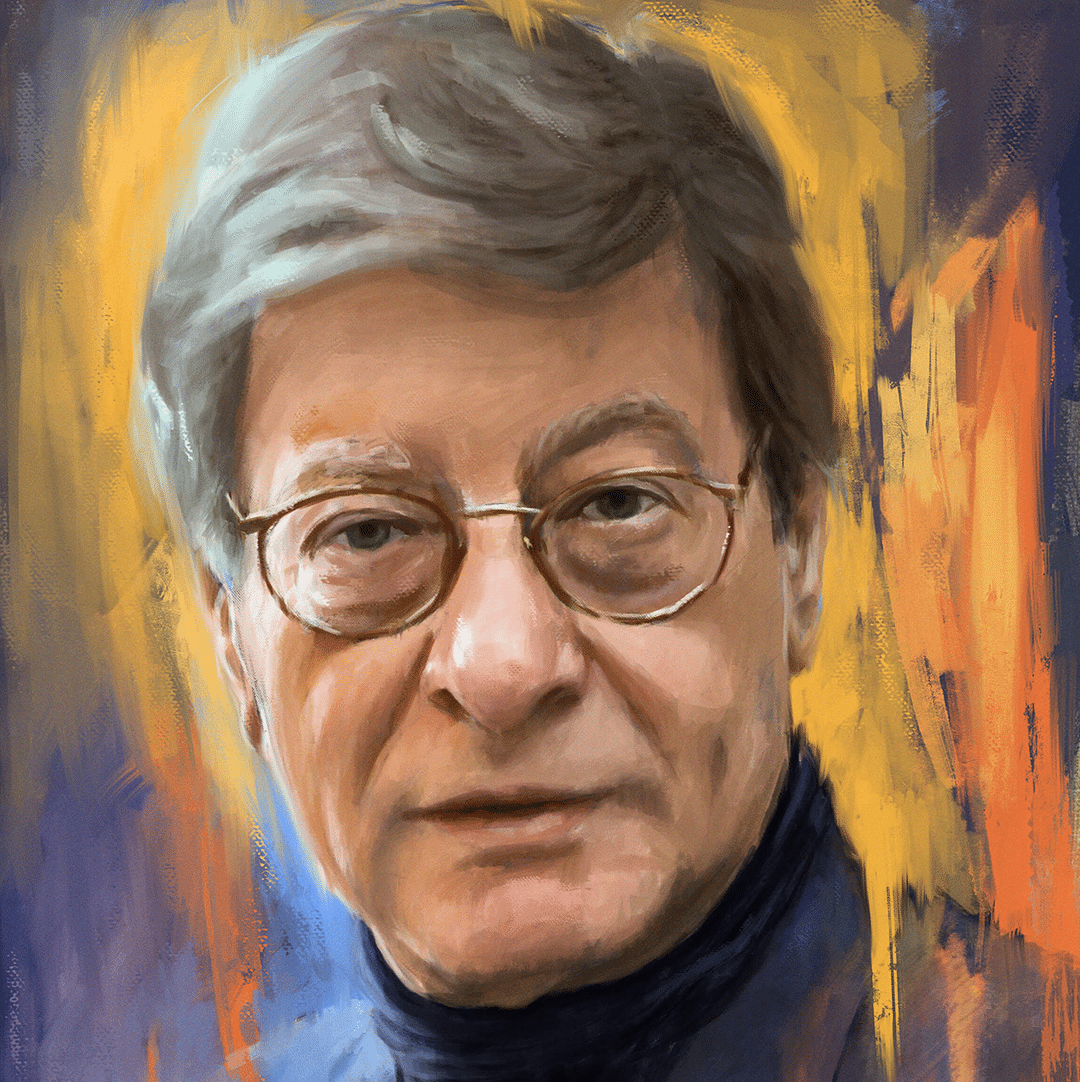
Painting of Mahmoud Darwish by Ahmad Kadi. Source: Ahmad Kadi website
Remembering Mahmoud Darwish. An essay by Naomi Shihab Nye, a poem by renowned Palestinian poet Mahmoud Darwish, and a short lesson by Linda Christensen utilizing Darwish’s work to help students “name the invisible forces that imprison them” and “things they love.”
“I Think the Word Is Dignity” — Rachel Corrie’s Letters from Gaza. Letters to her family from 23-year-old U.S. peace activist Rachel Corrie, who was killed in 2003 while trying to prevent the Israeli army from destroying homes in the Gaza Strip. Followed by questions by Bill Bigelow for classroom discussion.
A Roadmap to Peace?: Promises Documentary Lesson A lesson to accompany the 2001 documentary Promises, that explores the Palestinian-Israeli conflict from the eyes and experiences of Israeli and Palestinian children living in the West Bank. (The lesson can be used effectively without the film.)
Teaching Palestine: An interview with Palestinian educator Ziad Abbas by Jody Sokolower. Drawing on his experience growing up in a refugee camp in the West Bank and his work with youth, Abbas explores connections that bring Palestine to life for students in the United States.
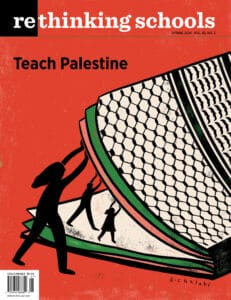 Rethinking Schools: Teach Palestine. The spring 2024 issue offers a collection of articles and other resources on teaching about Palestine-Israel amid the growing attack on social justice education.
Rethinking Schools: Teach Palestine. The spring 2024 issue offers a collection of articles and other resources on teaching about Palestine-Israel amid the growing attack on social justice education.
Subversives: Stories from the Red Scare by Ursula Wolfe-Rocca. Given the McCarthy era tactics being used to attempt to discredit any support for Palestinians and critiques of Israel — with accusations of antisemitism — we recommend introducing this lesson on McCarthyism. Students meet 27 different targets of government harassment and repression to analyze why disparate individuals might have become targets of the same campaign, determining what kind of threat they posed in the view of the U.S. government.
Toolkit to Defend K-12 Educators and Librarians Against False Accusations of Antisemitism compiled by Nora Lester Murad and Alice Rothchild. The purpose of this toolkit is to explain how false accusations of antisemitism are used to silence Palestinians and their allies in struggles against racism and colonialism. It lays out how K-12 teachers and librarians might realistically come under attack for fulfilling their professional and ethical obligations to include Palestinians in the world we teach to our children. It suggests how you can build support to try to reduce the impacts of attacks before they arise, and constructive ways to respond if they do.
Fellowship of Reconciliation
Continuing to Break the Silence: Learning and Reflection on Vietnam, Palestine, and Beyond A side-by-side reading of Dr. Martin Luther King’s “Beyond Vietnam: A Time to Break Silence” speech and Michelle Alexander’s 2019 op-ed “Time to Break the Silence on Palestine.” While this piece was written primarily for adult education, an adaptation for middle and high school teachers is included at the end of the document.
PBS Newshour
Educator Voice: Teachers know how to teach hard history about Palestine. Teacher Sarah DeBolt Badawi writes about ways to infuse the history of Palestine in various key places in the U.S. history scope and sequence, including World Wars I and II, the Civil Rights Movement, and the First Amendment.
Teach Palestine is a resource by and for K-12 teachers and teacher educators focused on bringing Palestine into classrooms and schools. It is a project of the Middle East Children’s Alliance (MECA), based in Berkeley. MECA is a nonprofit organization working for the rights of children in the Middle East by sending humanitarian aid, supporting projects for children, and educating North American and international communities about the effects of U.S. foreign policy on children in the region.
Teaching About the Crisis in Gaza: Guidance for Justice-Minded Educators
A guiding document to help schools and educators in the United States navigate the challenges to education posed by the 2023 escalation of the crisis in Gaza. Includes Q&A sections with extensive resources on “How do I answer students’ questions about current events in Israel and Gaza?”; “How do I create a container so that controversial discussions about Israel/Palestine are constructive and safe?”; and more. The document is a collaboration among volunteer educators and activists Fatima AlDajani, Jessica H. Darrow, Nora Lester Murad, Brandon Patterson, and Hadil Sarrar.
Challenge Islamophobia
Most teaching resources and teacher workshops about Islam and Muslims focus on increasing knowledge of religious texts, beliefs, and rituals rather than addressing the root causes of Islamophobia. Challenge Islamophobia, a project of Teaching for Change, addresses that gap by placing Islamophobia firmly within a U.S. context and shared cultural history.
The lessons are designed to avoid the need for a facilitator with specialized knowledge in Islamic studies. The lessons do not teach the details of Islamic faith and practice because Islam is not the root of Islamophobia. These lessons invite learners to think differently by investigating Islamophobia as a form of racism born from empire.
Challenge Antisemitism
Given the rise of antisemitism in the United States, as well as the frequent conflation of criticism of Israel with antisemitism, we share the following resources on dismantling antisemitism from a framework of collective liberation.
Understanding Antisemitism: An Offering to Our Movement by Jews for Racial & Economic Justice
Curriculum on Antisemitism from a Framework of Collective Liberation by PARCEO
Articles About K-12 Teachers and Students
Teachers Have the Right to Criticize Israel Without Censorship by Glenn Sacks in The Progressive
Our Union Called for a Cease-Fire. It’s About Our Students by Dave Stieber in In These Times
We Are American Jewish Educators, and We Demand a Cease-Fire by Hannah Klein and Jake Roth in Jacobin
Tinker v. Des Moines: Youth Rights in a Time of Plausible Genocide by Mary Beth Tinker at the Zinn Education Project
Anti-Palestinian racism in Canadian schools and what we can do about it by Nassim Elbardouh in The Monitor
Trouble at Teaneck High: Rep. Josh Gottheimer Goes to War Against High Schoolers Protesting for Gaza by Matthew Petti in The Intercept
PPS students walk out for Palestine, call for education on genocide: Students feel unheard and unsafe while teachers feel pressure for speaking out by Kevin Foster in StreetRoots
Reliable, Independent News Coverage
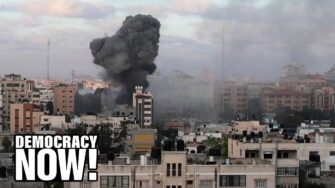
Democracy Now! is providing extensive coverage for the full hour of their daily broadcasts with selected interviews that can be used in the classroom. (See classroom story below.) Democracy Now!’s War and Peace Report provides listeners with access to people and perspectives rarely heard in the U.S. corporate-sponsored media, including independent and international journalists, people who are directly affected by U.S. foreign policy, grassroots leaders and peace activists, artists, academics and independent analysts. Their program is available on television, radio, and podcasts.
Al Jazeera’s free, live coverage is offering on the ground coverage from the Middle East (including Gaza), covering mass demonstrations, and more.
+972 Magazine is an independent magazine run by a group of Palestinian and Israeli journalists. Founded in 2010, their mission is to provide in-depth reporting, analysis, and opinions from the ground in Israel-Palestine.
Related to the media is the treatment of journalists and bias in the corporate media. We recommend reading:
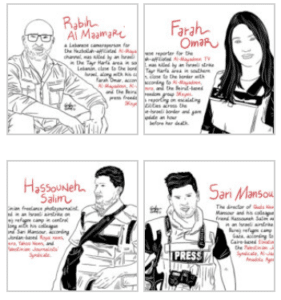 Faces of Tragedy offers stories about the dozens of journalists killed in the war by Israel against Palestine. From the World Association of News Publishers.
Faces of Tragedy offers stories about the dozens of journalists killed in the war by Israel against Palestine. From the World Association of News Publishers.
Fairness and Accuracy in Reporting offers detailed critiques of media coverage of Israel and Palestine. Students can apply those critiques to local coverage.
War Made Invisible: How America Hides the Human Toll of Its Military Machine by Norman Solomon opens with an epigraph from Aldous Huxley, written in 1936: “The propagandist’s purpose is to make one set of people forget that certain other sets of people are human.”
Fact Sheets and Infographics
Institute for Middle East Understanding Fact Sheets. The collection includes quick facts on the Palestinian Nakba (“Catastrophe”); Israel’s History of Spreading Disinformation; the Nakba and Palestine Refugees; Israel’s Environmental Apartheid in Palestine; and many more.
Visualizing Palestine was established in 2012, and is dedicated to using data and research to visually communicate Palestinian experiences, such as the graphic to the right, to provoke narrative change. “VP envisions a liberated future for Palestinians in a world free from oppression. We believe that dominant narratives serve to obscure, justify, and perpetuate oppressive power structures in society. Visualizing Palestine is dedicated to creating narrative interventions that shift these power dynamics, making Palestinian narratives more visible, widely accessible, and powerful as part of wider anti-colonial and anti-racist narratives.”
The Costs of War project conducts and publishes research to facilitate debate about the ongoing consequences of the United States post-9/11 wars in Afghanistan, Iraq and elsewhere; the costs of the U.S. global military footprint; and the domestic effects of U.S. military spending. Created in 2010 and housed at Brown University’s Watson Institute for International and Public Affairs, the Costs of War project builds on the work of over 60 scholars, experts, human rights advocates, and physicians from around the world.
Mona Chalabi’s Data Visualizations. Pulitzer Prize winning artist and journalist Mona Chalabi creates data visualizations on a wide range of topics, including Palestine. Read about her media analysis in The Washington Post, “After Pulitzer win, New York Times contributor criticizes Gaza coverage,” and see examples of her visualizations on her Instagram feed, such as the one to the right. Her art could be a prompt for student designed visualizations.
Books
 Social Justice Books list of titles for K-12 and educators on Palestine.
Social Justice Books list of titles for K-12 and educators on Palestine.
The collection includes picture books, chapter books, poetry, and background reading for educators.
Key Articles
We have heard from many people looking for readings on Palestine and Israel that clearly, thoughtfully articulate the stakes of this moment. Here is a recent selection of pieces we recommend. Also see Pali Answers, a crowdsourced database of short responses to anti-Palestine talking points.
What Does It Mean to Be Palestinian Now? by Noura Erakat, Ahmed Moor, Noor Hindi, Mohammed El-Kurd, and Laila Al-Arian in The Nation
On Antisemitism, Anti-Zionism and Dangerous Conflations, a Jewish Voice for Peace and PARCEO explainer
Anti-Palestinian Racism 101, an explainer and set of resources by Beisan Zubi
Gaza Is a Prison Under Siege. This Is My Letter to the World Outside by Ahmed Abu Artema in Truthout
Israel’s Violence Will Never Bring ‘Safety’ to Anyone, Including Jews by Sarah Lazare and Maya Schenwar in Truthout
The Colonial History of Israel-Palestine: Bringing the Receipts by Karen Attiah in The Washington Post
U.S. Labor Has Long Been A Stalwart Backer of Israel. That’s Starting to Change by Jeff Schuhrke in Jacobin
Black Reconstruction in Palestine: From the Combahee River to the Caribbean Sea by Geo Maher in Spectre
Unveiling Parallel Atrocities: Historical Connections between the Genocide in Gaza and U.S./Israel-Supported Genocides in Central America by Cristian Padilla Romero in Migrant Roots Media
Will the ‘cancel culture’ crowd speak up about the silencing of Asna Tabassum? Don’t hold your breath by Arwa Mahdawi in The Guardian
Anatomy of a Moral Panic by Adam Haber and Matylda Figlerowicz in Jewish Currents
It’s not Islamophobia, it’s anti-Palestinian racism by Abdallah Fayyad in Vox
The decimation of Gaza’s academia is ‘impossible to quantify’ by Ibtisam Mahdi in +972 Magazine
Israel’s War on Gaza Is Also a War on History by Jesse Hagopian in The Progressive
More Readings
Resignation letter from the New York Times by Anne Boyer via Literary Hub
The Real Origins of the Ethnic Cleansing of Palestine Began Long Before 1948 by Kelly Hayes with Zachary Foster in Truthout
The Extreme Ambitions of West Bank Settlers by Isaac Chotiner with Daniella Weiss in The New Yorker
Congressional Support for a Cease-Fire Isn’t Too Much to Ask by Dave Zirin in The Nation
No Human Being Can Exist by Saree Makdisi in n+1
Israel Must Stop Weaponizing the Holocaust by Raz Segal in The Guardian
On Mourning and Statehood: A Response to Joshua Leifer by Gabriel Winant in Dissent
Israeli Apartheid Is at the Heart of the Brutality in Gaza and Israel by Phyllis Bennis in In These Times
We Cannot Cross Until We Carry Each Other by Arielle Angel in Jewish Currents
Where the Palestinian Political Project Goes from Here by Isaac Chotiner with Tareq Baconi in The New Yorker
Have We Learned Nothing? by David Klion in n+1
The Hamas Attacks and Israeli Response: An Explainer Answers to readers’ questions (from Oct. 7 – 16) about the situation in Israel and Palestine by Alex Kane, Mari Cohen, Jonathan Shamir, and Isaac Scher in Jewish Currents
From a fall collection at The Drift:
Propaganda, Disinformation, Ideology by Erik Baker
A Desperate Situation Getting More Desperate with Rashid Khalidi
Turning the Tables by Nancy Ko
Dispatches on the War on Gaza by Bobuq Sayed, Dylan Saba, Hadas Binyamini, Mariam Barghouti, Nasreen Abd Elal, Natan Last, and Sophia Goodfriend
Calls to Action and Open Letters
URGENT: Stop genocide against Palestinians in Gaza. Call to action and related resources from Jewish Voice for Peace
Open Letter to MCPS on Actions Toward Teachers About Palestine and Israel
Stop the Gaza Genocide. Call to action and related resources from the U.S. Campaign for Palestinian Rights
A Dangerous Conflation: An open letter from Jewish writers
Climate Community Pledge in Support of a Ceasefire
Open Letter to the National Education Association. From U.S. public school educators — see press release
Short Films, Film Clips, and Feature Films
How Israel Went From Helping Create Hamas to Bombing It by Mehdi Hasan on The Intercept
How Palestinians were expelled from their homes via Vox
Noura Erakat interview about possible war crimes in Gaza on BBC News
“Atmosphere of Hate”: AFSC Leader on Shooting of 3 College Students on Democracy Now!
Peter Beinart: Israel Will Only Be Secure & Safe If Palestinians Are Given Freedom on Democracy Now!
“Clear Intention of Ethnic Cleansing”: Israeli Holocaust Scholar Omer Bartov Warns of Genocide in Gaza on Democracy Now!
Ta-Nehisi Coates Speaks Out Against Israel’s “Segregationist Apartheid Regime” After West Bank Visit on Democracy Now!
Israeli Historian Ilan Pappé on Gaza War, Hostages & the Context Behind Current Violence on Democracy Now!
Israeli Journalist Amira Hass: How Can the World Stand By and Witness Israel’s Slaughter in Gaza? on Democracy Now!
Palestine is Still the Issue by John Pilger
The Occupation of the American Mind
“A stunning exposé on how propaganda drives public opinion and, in turn, our understanding of reality. Here’s the story of how American perceptions of the Middle East — as well as resulting legislation and military strategy — are engineered: from focus group to talking points to mortar fire.” — Douglas Rushkoff, professor, Media Theory, CUNY, and Media Commentator for CNN
The documentary is available for free at the Occupation of the American Mind website, in various lengths including 21 min. (below), 45 min., and 84 min.
‘The Night Won’t End’: Biden’s War on Gaza
From air strikes to field executions, Fault Lines investigates the killings of civilians by the Israeli military in Gaza and the role of the United States in the war. United States weapons transfers — from 2,000-pound bombs to artillery shells and tanks — have been a crucial part of the Israeli military campaign. Fault Lines worked with journalists in Gaza to profile three families as they try to survive the war.
Watch the free 78-min. documentary here. Content Warning: Graphic images and videos of violence and trauma.
The Present
A father and his daughter in the West Bank head out on what should be an enjoyable trip to buy food for supper and a wedding anniversary gift. They face extreme challenges coming and going through the checkpoints. This 24-minute film, trailer below, is available on Prime Video. See viewing and discussion guide.
Another short film developed for classroom use is from the Crash Course series, Conflict in Israel and Palestine
Feature-length films we recommend include:
5 Broken Cameras (POV)
And There Was Israel (Icarus)
Israelism (Tikkun Olam)
Podcasts and Recorded Talks
Palestine, an episode of NPR’s Throughline
Two Palestinian American writers on being denied the “right to a story,” an episode of NPR’s Code Switch
As American Jews speak out on Israel, some see rifts in their communities, an episode of NPR’s Code Switch
What James Baldwin can teach us about Israel, and ourselves, an episode of NPR’s Code Switch
The War on Palestine Podcast with Noura Erakat, Ziad Abu-Rish, and Bassam Haddad. A brief regular program with on the ground updates from Palestine and focused analysis.
The Gaza Cauldron with Marwan Bishara on The Intercept
The Palestine Teach-In on The Dig
See other The Dig episodes, including War on Gaza with Noura Erakat and Arielle Angel and Hamas with Tareq Baconi.
Palestine Solidarity Encampments Are a Rehearsal for Liberatory Self-Governance with Kelly Hayes on Truthout‘s Movement Memos
See other recent Movement Memos episodes here.
A History of Modern Palestine on American Prestige with Rashid Khalidi. Six episodes of the podcast based on Khalidi’s book The Hundred Years’ War on Palestine: A History of Settler Colonialism and Resistance, 1917-2017
Black Feminist Writers and Palestine with Clarissa Brooks, Angela Y. Davis, Breya Johnson, Briona Simone Jones, Beverly Guy-Sheftall, and Jaimee A. Swift, hosted by Black Women Radicals on Oct 22, 2023. In that conversation, Davis said: “[June Jordan] was absolutely right: our relation to Palestine says a great deal about our capacity to respond to complex, contemporary issues, whether we are talking about imperialism, settler-colonialism, global racism, transphobia, homophobia, the climate, and all the related questions. I just want to repeat again what June said: Palestine is a litmus test, especially now.”
On Zionism and Anti-Zionism on “On the Nose” by Jewish Currents. See other recent episodes here.
From the Archives
1948: To the Editors of The New York Times by Albert Einstein, Hannah Arendt, Sidney Hook, et al.
1967: Statement on Palestine by the Student Nonviolent Coordinating Committee (transcript of the first document)
1989: Oberlin College Commencement Address by Audre Lorde
2004: Our War on Terrorism by Howard Zinn
Climate and Environment
Projects and Organizations
Adalah: The Legal Center for Arab Minority Rights in Israel is an independent human rights organization and legal center. Adalah (“justice” in Arabic) is the first Palestinian Arab-run legal center in Israel, and the sole Palestinian organization that works before Israeli courts to protect the human rights of Palestinians in Israel and in the OPT.
Al-Haq is an independent Palestinian non-governmental human rights organization based in Ramallah, West Bank. Al-Haq documents violations of the individual and collective rights of Palestinians in the OPT, irrespective of the identity of the perpetrator, and seeks to end such breaches by way of advocacy before national and international mechanisms and by holding the violators accountable.
Breaking the Silence is an organization of veteran soldiers who have served in the Israeli military since the start of the Second Intifada and have taken it upon themselves to expose the public to the reality of everyday life in the Occupied Territories. “We endeavor to stimulate public debate about the price paid for a reality in which young soldiers face a civilian population on a daily basis, and are engaged in the control of that population’s everyday life. Our work aims to bring an end to the occupation.”
B’Tselem – The Israeli Information Center for Human Rights in the Occupied Territories strives for a future in which human rights, liberty, and equality are guaranteed to all people, Palestinian and Jewish alike, living between the Jordan River and the Mediterranean Sea. “Since B’Tselem’s inception in 1989, we have been documenting, researching and publishing statistics, testimonies, video footage, position papers and reports on human rights violations committed by Israel in the Occupied Territories.”
Deadly Exchange is a campaign by Jewish Voice for Peace to end U.S. law enforcement trainings in Israel. “Both the U.S. and Israeli governments perpetuate the deadly falsehood that violence against some communities will create security for others. The exchanges bring together police, ICE, border patrol, and FBI from the US with soldiers, police, border agents, etc. from Israel. In these programs, ‘worst practices’ are shared to promote and extend discriminatory and repressive policing practices that already exist in both countries, including racial profiling, massive spying and surveillance, deportation and detention, and attacks on human rights defenders.”
Nakba Curriculum from Project 48 offers the opportunity to learn about the robust Palestinian society that existed prior to the Nakba, the critical events leading up to and during 1948, and a prism through which to understand the ongoing nature of the Nakba and its impact on Palestinian lives.
Teaching While Muslim works to actively include social justice, anti-racist, and anti-Islamophobic curricula and educators in schools. They (1) centralize resources and examples of culturally responsive materials that address the lack of diversity in teaching about Muslim identity, (2) address the need for teacher training in bias, intersectionality, and social justice through professional development services; (3) assist Muslim educators in navigating through public schools; and (4) organize workshops on how implicit biases can negatively affect teacher-student relationships.
Classroom Stories
Here are stories from educators about teaching about Palestine and Israel. Share your teaching story and we’ll send you a free copy of War Made Invisible: How America Hides the Human Toll of Its Military Machine by Norman Solomon.
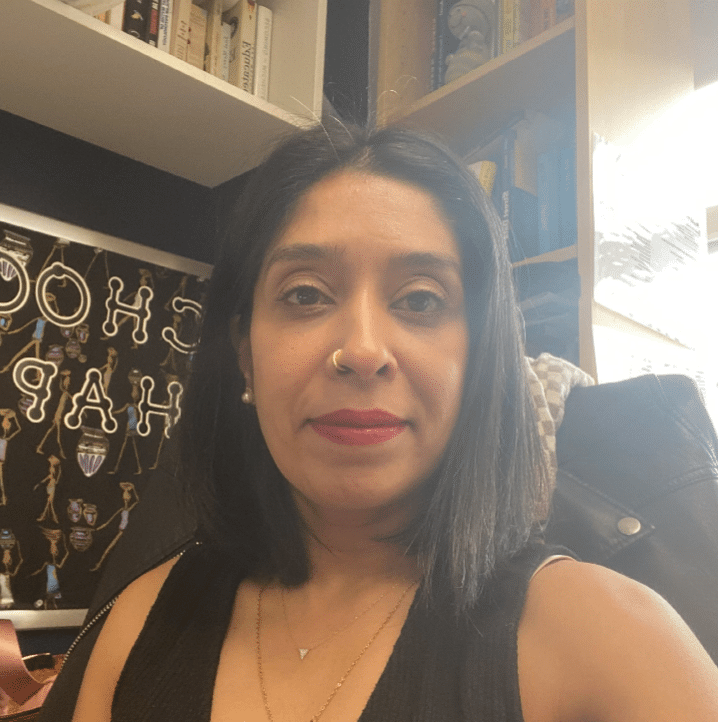
In my capacity as a secondary history educator, I strategically incorporated a Democracy Now! interview clip featuring Rashid Khalidi to provide nuanced context and analysis regarding the ongoing humanitarian crisis in Gaza. Khalidi, a distinguished scholar in Middle Eastern studies, offered a profound perspective that transcended mainstream narratives. The interview not only illuminated historical roots but also shed light on the contemporary complexities of the crisis. As a pedagogical tool, this interview clip became a catalyst for critical discussions in my high school classroom, fostering a more comprehensive understanding of the sociopolitical factors contributing to the situation. By engaging my students with Khalidi’s insights, I aimed to cultivate a critical awareness of diverse perspectives, encouraging them to question dominant narratives and develop analytical skills essential for informed citizenship.
I have used the “Independence or Catastrophe” resource coupled with a lecture for more background in my class with great success. Students are eager to discuss and learn more about the larger historical context and challenge corporate media narratives that do not align with their values as young people. As a recent Gallup poll suggests, students are challenging the narrative in large part due to the work of Palestinian journalists on the ground in Gaza through social media.
While I do have concerns about being doxed or having complaints laid upon me, my job as an educator is to inform young people about the world around them and this development is one of the most significant historical tragedies of the century. It cannot be ignored or put aside. Young people deserve the space to learn, unlearn, reflect, and build their world views in schools.
Thank you for providing sources and standing with teachers in this time.
It has been a challenge addressing what is happening in Palestine and Israel. Unfortunately, the majority of my coworkers are unconditional supporters of Israel and co-sign the United States’ extraordinary military support of this ruthless regime. These are typically “progressive” folks who have greatly disappointed me. Even in the face of my calm requests for dialogue and my sharing resources that challenge the majority narrative, it’s clear that this issue has become so propagandized that there is little room for discourse.
On the other hand, my district’s central office has shared Zinn Education Project resources with all social studies teachers and several high schools in the county have organized student-led walkouts in support of a ceasefire and against the United States’ involvement in Israel. Central office is asking administrators at these schools to excuse participating students’ absences.
In terms of my instruction, I have tried to focus on centering a people’s history of the United States’ unequivocal support of Israel. Through this lens and in employing an inquiry-based model, students are discovering the truth about what is going on — without me having to say much of anything at all. They are poking holes in the dominant narrative that Israel is a perfect democracy while Palestinians are vandals who do not deserve our sympathies.
As a teacher, I observe time after time that youth are leading the way.
— Anonymous
High School Teacher
View this post on Instagram
— Scheherazan Al-Salamin
Dobbs Ferry, New York Elementary Social Studies Curriculum Writer
Read about challenges to teaching this history in Crackdown on Palestine in education goes far beyond universities by Michael Arria in Mondoweiss.
Share your teaching story and we’ll send you a free copy of War Made Invisible: How America Hides the Human Toll of Its Military Machine by Norman Solomon.

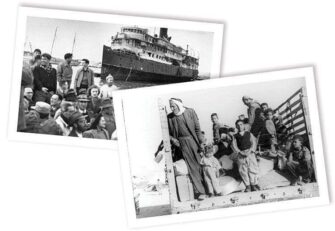
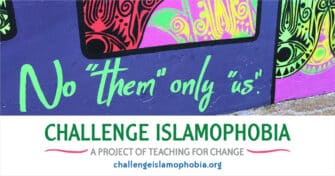
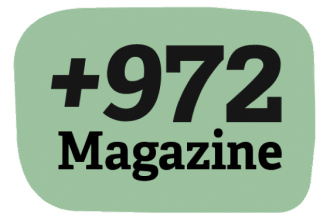
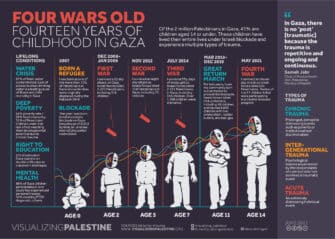
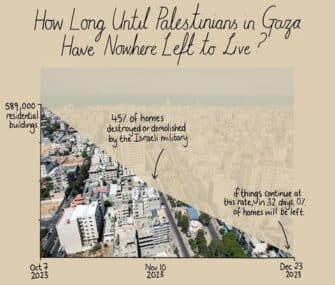
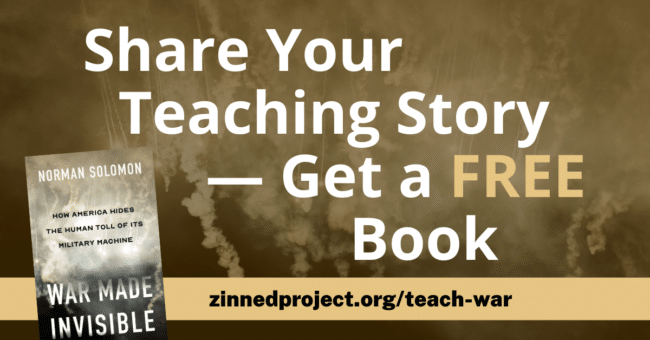
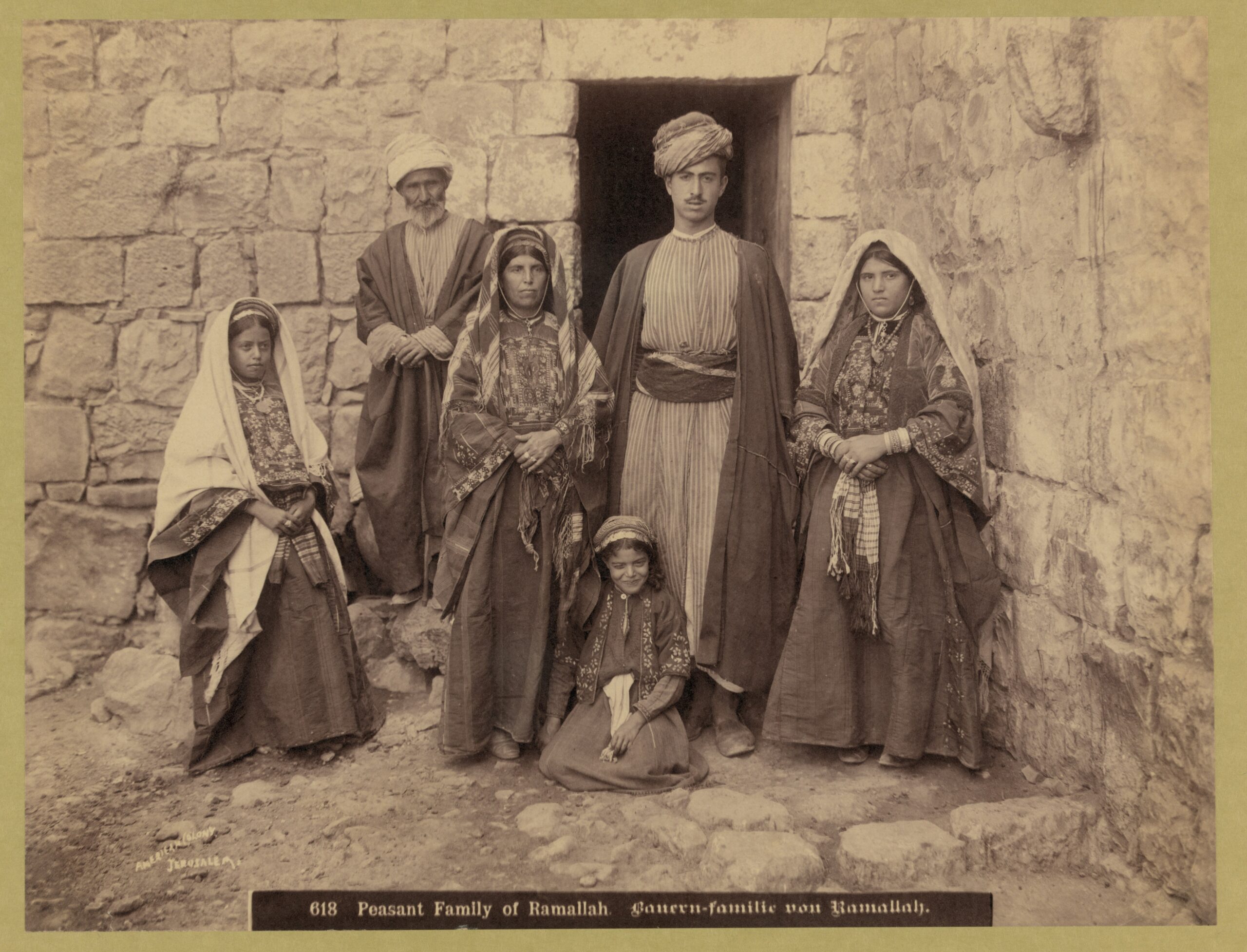
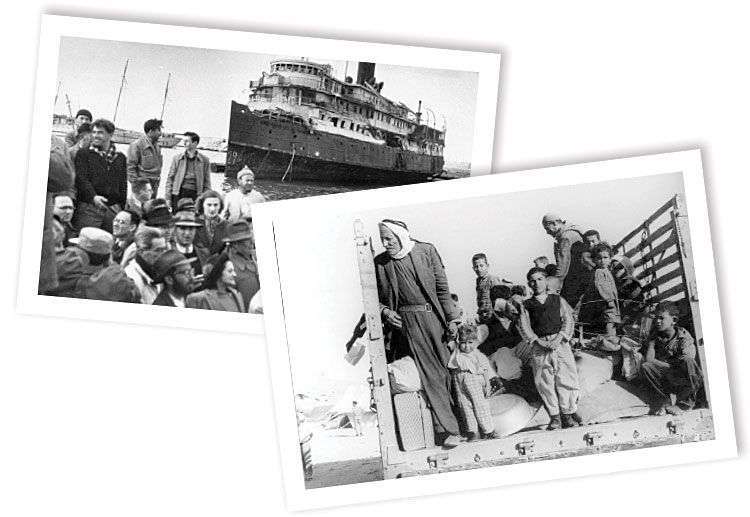
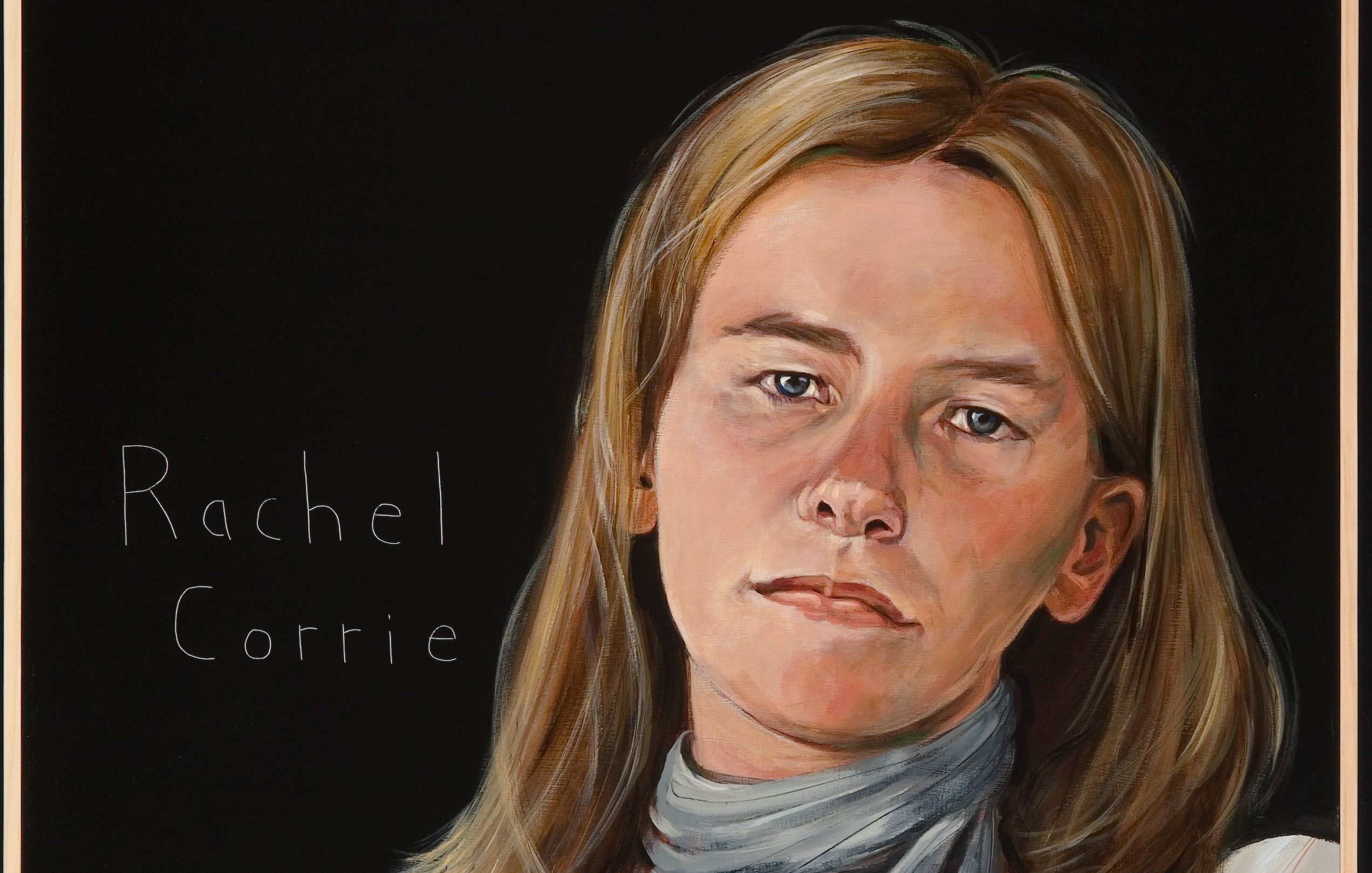
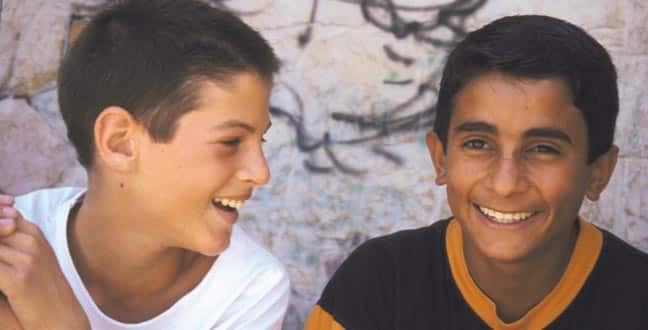
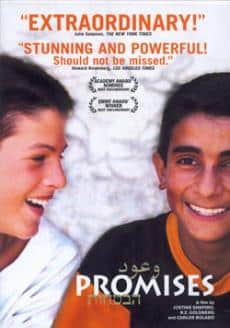
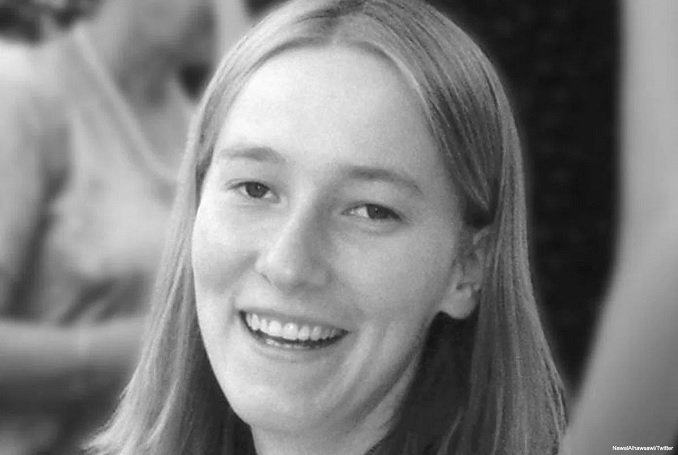
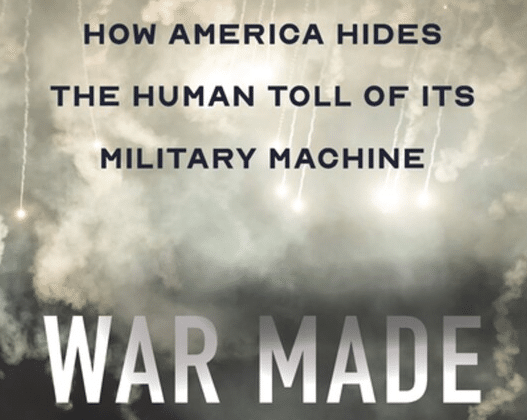





Palestimeline: Interactive Toolkit of Educator Resources
https://docs.google.com/presentation/d/1u03lvFtD0-i0wxHUSOd8svxuj5vH0T6fzt5ZoJk4DpM/mobilepresent?slide=id.g2a9398ec5d9_2_242&lsrp=1
As a veteran educator who has taught social studies and English for over 20 years, the resources you have provided about the history of the middle east conflict is refreshing, truthful, well researched and desperately needed. Thank you so much!
Thank you so much for this list of resources to inform teaching and learning on Palestine and Israel at this devastating moment. It is by far the best I’ve seen, particularly in its representation of Palestinians and Palestinian voices.
At times like these, teachers turn to organizations they know and trust for guidance and materials to inform their teaching. Yet what I have seen shared by most organizations that teachers may rely on has ranged from nonexistent, to incomplete and disappointing, to inaccurate and dangerous. Thank you for compiling a range of resources in various media from the United States and from Palestine and Israel. I have shared this list and will continue to do so.
I’ve been compiling materials (including your list) to share with friends and colleagues as well, and there are a couple I recommend for addition to your excellent list.
Jewish Currents has published “The Hamas Attacks and the Israeli Response: An Explainer,” which answers many important and basic questions about these events.
On the realities of Palestinian life under Israeli occupation, these two films capture in powerful and deeply human ways what it has meant for Palestinians to live under Israeli military occupation in the West Bank.
The Present, winner of 2021 BAFTA for Best Short Film and nominated for the Oscar for Best Live-Action Short Film, 24. min. Streams on Netflix.
Five Broken Cameras, nominated for the Oscar for Best Documentary Feature in 2013. I can tell you that I showed this film to my students in Washington, D.C. in 2015 and received incredibly positive responses from them.
On the creation of the state of Israel
This short video from Vox (16 minutes), How Palestinians were expelled from their homes, does a remarkably thorough job of explaining how the state of Israel was created and what that meant for the people of Palestine.
Al Jazeera’s coverage has also been outstanding for daily reports and discussion panels. They may be the only major international news organization with their own reporters in Gaza.
I’ve also written a few lessons that relate to Palestine. All of these were written for the Fellowship of Reconciliation and are published on their website. The first two are part of a curriculum guide I created to accompany their 1957 comic book, “Martin Luther King and the Montgomery Story.” The full guide is here: https://forusa.org/mlkstudy/ But I’ll highlight the most relevant lessons below + another free-standing one.
– Boycotts: Goals, Methods, and Challenges from the U.S. to South Africa to Israel-Palestine
– This lesson features Palestinian activist Ahed Tamimi, who was repeatedly arrested as a child: Young People Taking a Stand: From Claudette Colvin to Today
– (not part of MLK comic project) This is a side-by-side reading of Dr. King’s “Beyond Vietnam: Time to Break Silence” speech and Michelle Alexander’s 2019 op-ed “Time to Break Silence on Palestine.” Though it’s more of an adult ed piece, I included at the end an alternative/adapted version for k-12 teachers.
I hope these may be helpful to you all and your readers. Keep up the great work!